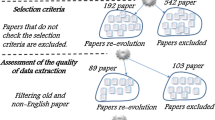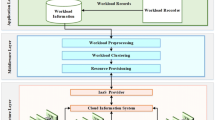Abstract
Resource reconstruction algorithms are studied in this paper to solve the problem of resource on-demand allocation and improve the efficiency of resource utilization in virtual computing resource pool. Based on the idea of resource virtualization and the analysis of the resource status transition, the resource allocation process and the necessity of resource reconstruction are presented. Resource reconstruction algorithms are designed to determine the resource reconstruction types, and it is shown that they can achieve the goal of resource on-demand allocation through three methodologies: resource combination, resource split, and resource random adjustment. The effects that the resource users have on the resource reconstruction results, the deviation between resources and requirements, and the uniformity of resource distribution are studied by three experiments. The experiments show that resource reconstruction has a close relationship with resource requirements, but it is not the same with current distribution of resources. The algorithms can complete the resource adjustment with a lower cost and form the logic resources to match the demands of resource users easily.
Similar content being viewed by others
References
H. Jin, X. F. Liao. Virtualization technology for computing system. China Basic Science, vol. 10, no. 6, pp. 12–18, 2008. (in Chinese)
A. Tang, Z. Liu, C. H. Xia, Z. Li. Distributed resource allocation for stream data processing. In Proceedings of International Conference on High Performance Computing and Communications, Munich, Germany, pp. 91–100, 2006.
X. Zhang, M. F. Zhu, L. M. Xiao. Research on virtualization technology of distributed I/O resource. Microelectronics and Computer, vol. 25, no. 10, pp. 178–181, 2008. (in Chinese)
X. M. Tang, J. S Yu. Feedback scheduling of model-based networked control systems with flexible workload. International Journal of Automation and Computing, vol. 5, no. 4, pp. 389–394, 2008.
A. R. Molina, A. Ponniah, J. Simcock, M. S. Irwin, C. M. Malata. Resource implications of bilateral autologous breast reconstruction — A single centre’s seven year experience. Journal of Plastic Reconstructive and Aesthetic Surgery, vol. 63, no. 10, pp. 1588–1591, 2010.
R. R. Huang, W. Xue, J. W. Shu, W. M. Zheng. Storage performance virtualization under out-of-band structure. Journal of Chinese Computer Systems, vol. 28, no. 6, pp. 1139–1143, 2007.
G. Y. Zhang, J. W. Shu, W. Xue, W. M. Zheng. A persistent out-of-band virtualization system. Journal of Computer Research and Development, vol. 43, no. 10, pp. 1842–1848, 2006. (in Chinese)
W. Yu, J. Wang. Scalable network resource management for large scale virtual private networks. Simulation Modelling Practice and Theory, vol. 12, no. 3–4, pp. 263–285, 2004.
A. A. Chien, N. Taesombut. Integrated resource management for lambda-grids: The distributed virtual computer (DVC). Future Generation Computer Systems, vol. 25, no. 2, pp. 147–152, 2009.
K. Zhou, X. J. Tong, W. B. Liu. Sensitivity analysis of source management. Journal of Huazhong University of Science and Technology, vol. 34, no. 8, pp. 122–124, 2006. (in Chinese)
K. Zhou, X. J. Tong, Z. H. Gao, Q. S. Gao. Analysis and implementation of mathematica-based algorithm for source management. Journal of Huazhong University of Science and Technology (Nature Science), vol. 34, no. 7, pp. 57–59, 2006. (in Chinese)
M. Ghobadi, S. Ganti, C. S. Gholamali. Resource optimization algorithms for virtual private networks using the hose model. Computer Networks: The International Journal of Computer and Telecommunications Networking, vol. 52, no. 16, pp. 3130–3147, 2008.
Y. T. Lu, N. Xiao, X. J. Yang. Scalable resource management system for high productive computing. In Proceedings of the 3rd China Grid Annual Conference, IEEE, Dunhuang, PRC, vol. 3, pp. 331–337, 2008.
Z. K. Wang, Y. Chen, D. Gmach, S. Singhal, B. J. Watson, W. Rivera, X. Zhu, C. D. Hyser. AppRAISE: Applicationlevel performance management in virtualized server environments. IEEE Transactions on Network and Service Management, vol. 6, no. 4, pp. 240–254, 2009.
S. S. Thamarai, R. A. Balachandar, R. Kumar, P. Balakrishnan, K. Rajendar, R. Rajiv, G. Kannan, G. R. Britto, E. Mahendran, B. Madusudhanan. CARE resource broker: A framework for scheduling and supporting virtual resource management. Future Generation Computer Systems, vol. 26, no. 3, pp. 337–347, 2010.
T. Li, Y. L. Yang. Algorithms of reconfigurable resource management and hardware task placement. Journal of Computer Research and Development, vol. 45, no. 2, pp. 375–382, 2008. (in Chinese)
F. Song. Failure-aware resource management for highavailability computing clusters with distributed virtual machines. Journal of Parallel and Distributed Computing, vol. 70, no. 4, pp. 384–393, 2010.
Y. Liao, X. D. Chen, N. Sang, L. H. Hu, G. Z. Xiong, Q. X. Zhu. Adaptive resource management middleware in distributed real-time systems. Journal of University of Electronic Science and Technology of China, vol. 37, no. 1, pp. 101–104, 2008. (in Chinese)
T. Wood, P. Shenoy, A. Venkataramani, M. Yousif. Sandpiper: Black-box and gray-box resource management for virtual machines. Computer Networks, vol. 53, no. 17, pp. 2923–2938, 2009.
D. Gmach, J. Rolia, L. Cherkasova, A. Kemper. Resource pool management: Reactive versus proactive or let’s be friends. Computer Networks, vol. 53, no. 17, pp. 2905–2922, 2009.
N. V. Hien, F. D. Tran, J. M. Menaud. SLA-aware virtual resource management for cloud infrastructures. In Proceedings of the 9th IEEE International Conference on Computer and Information Technology, IEEE, Xiamen, PRC, vol. 1, pp. 357–362, 2009.
H. N. Van, F. D. Tran, J. M. Menaud. Autonomic virtual resource management for service hosting platforms. In Proceedings of ICSE Workshop on Software Engineering Challenges of Cloud Computing, IEEE, Vancouver, Canada, vol. 1, pp. 1–8, 2009.
J. Qi, X. Li, N. Hu, X. H. Zhou, Y. C. Gong, F. Wang. Algorithms of resource management for reconfigurable systems based on hardware task vertexes. Acta Electronica Sinica, vol. 34, no. 11, pp. 2094–2098, 2006. (in Chinese)
Y. J. Joung. On quorum systems for group resources allocation. Distributed Computing, vol. 22, no. 3, pp. 197–214, 2010.
G. Y.Wei, A. V. Vasilakos, Y. Zheng, N. X. Xiong. A gametheoretic method of fair resource allocation for cloud computing services. The Journal of Supercomputing, vol. 54, no. 2, pp. 252–269, 2009.
K. Jansen, L. Porkolab. On preemptive resource constrained scheduling: Polynomial-time approximation schemes. Integer Programming and Combinatorial Optimization, vol. 2337, pp. 329–349, 2006.
Y. Hirozumi, E. F. Khaled, V. B. Gregor, H. Teruo. Protocol synthesis and re-synthesis with optimal allocation of resources based on extended Petri nets. Distributed Computing, vol. 16, no. 1, pp. 21–35, 2003.
A. Panconesi, M. Sozio. Fast primal-dual distributed algorithms for scheduling and matching problems. Distributed Computing, vol. 22, no. 4, pp. 269–283, 2010.
Z. Q. Sheng, C. P. Tang, C. X. Lv. Modeling of agile intelligent manufacturing-oriented production scheduling system. International Journal of Automation and Computing, vol.7, no. 4, pp. 596–602, 2010.
Q. Wang, W. R. Zhong, F. G. Zhong. XML-based data processing in network supported collaborative design. International Journal of Automation and Computing, vol.7, no. 3, pp. 330–335, 2010.
Y. Chang, S. Wilkinson, R. Potangaroa, E. Seville. Donordriven resource procurement for post-disaster reconstruction: Constraints and actions. Habitat International, vol. 35, no. 2, pp. 199–205, 2011.
Author information
Authors and Affiliations
Corresponding author
Additional information
This work was supported by National High Technology Research and Development Program of China (863 Program) (No. 2007AA010305) and the Excellent Doctor Degree Dissertation Fund of Xi’an University of Technology (No. 102-211007).
Xiao-Jun Chen received the bachelor degree from Department of Industrial Engineering of Xi’an University of Technology, PRC in 2004 and the master degree from School of Economics and Management of Xi’an University of Technology in 2009. He entered School of Computer Science and Engineering of Xi’an University of Technology to learn about distributed computing technology in 2008. He engaged in software development job from September, 2004 to September, 2006 in Delta. Software Company. He is now a member of IEEE Computer Society. He has published 8 papers since 2006.
His research interests include virtual technology and cloud computing.
Jing Zhang received the bachelor degree from Department of Automatic Control of Xi’an University of Technology, PRC in 1981, the master degree from Department of Software and Theory of Xi’an Jiaotong University, PRC in 1986, and the doctor degree from Department of Systems Engineering of Xi’an Jiaotong University in 1994. He has worked in Department of Computer of Xi’an University of Technology since 1977, and now is a professor and the Ph.D. supervisor of School of Computer Science and Engineering, Xi’an University of Technology. Of which, he worked in Computer Training Center of Ministry of Education, PRC in 1982 for a short time. He has published 60 papers and hosted 20 research projects in recent 10 years, of which, completed 863 Programs. He has published 4 books, of which, representatives are Artificial Intelligence Basis (Electronic Industry Press, Beijing, 2000), Practical Course on Computer Network (Electronic Industry Press, Beijing, 2007) and Computer Network (Xidian University Press, Xi’an, Shaanxi, 2007). He is now one of the national key new product projects consultants and a Xi’an information technology consultant. He is also a Shaanxi manufacturing informatization expert, the member of Services Computing Professional Committee in China Computer Federation, member of E-government and Office Automation Committee in China Computer Federation, the evaluation expert of National Natural Science Foundation and the member of IBM Software Innovation Center Expert Committee.
His research interests include distributed system, virtualization, grid computing and cloud computing.
Jun-Huai Li received the bachelor degree from Department of Computer Science and technology of Xi’an University of Technology, PRC in 1994, the master degree in Department of Computer Application of Xi’an University of Technology in 1997, and the doctoral degree from Department of Software and Theory of Northwestern Polytechnic University (NPU), PRC in 2002. He made a cooperation research in university of Tsukuba, Japan in 2004. He has worked in Department of Computer Science and Engineering of Xi’an University of Technology since 1997, and now is a professor and a master supervisor of School of Computer Science and Engineering, Xi’an University of Technology. He is also the dean of Department of Computer Science and Technology and the dean of Network and Information Management Center. He has published 40 papers and hosted 12 research projects in recent 10 years, of which, completed four 863 Programs. He has published 3 books, of which, representatives are Practical Course on Computer Network (Electronic Industry Press, Beijing, 2007), Computer Network (Xidian University Press, Xi’an, Shaanxi, 2007), and Network Security Technology (Xidian University Press, Xi’an, Shaanxi, 2010). He is a member of Chinese Computer Society and a member of IEEE.
His research interests include network computing, distributed computing internet technology, RFID technology, and web data mining.
Xiang Li received the bachelor degree from Department of Computer Application of Xi’an Jiaotong University, PRC in 2000 and the master degree from Department of Software and Theory of Xi’an Jiaotong University, PRC in 2003. She has entered into School of Computer Science and Engineering of Xi’an University of Technology to learn about distributed computing technology since 2008. After graduation from Xi’an Jiaotong university, she has been working in Shannxi University of Science and Technology, and now she is a lecturer of School of Electronic Engineering, Shannxi University of Science and Technology. She has published 10 papers since 2000.
Her research interests include distributed system and parallel computing with multi-cores.
Rights and permissions
About this article
Cite this article
Chen, XJ., Zhang, J., Li, JH. et al. Resource reconstruction algorithms for on-demand allocation in virtual computing resource pool. Int. J. Autom. Comput. 9, 142–154 (2012). https://doi.org/10.1007/s11633-012-0627-3
Received:
Revised:
Published:
Issue Date:
DOI: https://doi.org/10.1007/s11633-012-0627-3




